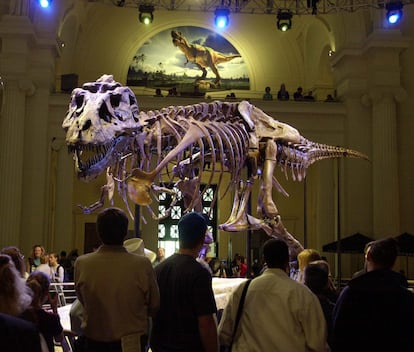Dinosaurs: The questionable luxury item for those who have it all
While the fossils sell for millions, paleontologists denounce the private collectors and auction houses that trade in them, labeling them as ‘thieves of time’ who take specimens away from science

Out of the wastelands of Wyoming, Montana, the Dakotas and Wisconsin emerge ghosts of the past: skeletons of dinosaurs that end up in auction houses where they are sold for millions of dollars to collectors, institutions and even Hollywood actors who are willing to pay fortunes for them. Although the trade always existed, in 1997 new ground was broken when Sotheby’s sold a Tyrannosaurus rex nicknamed Sue for $8.4 million that had been found in South Dakota; nine bidders competed for the animal, and the winner was Chicago’s Field Museum of Natural History.
That landmark sale brought to light a new business for fossil hunters and auction houses. In November 2020, at Christie’s New York, another T. rex (Stan) was sold for $31.8 million. Never had a dinosaur fetched so much. Discovered in South Dakota in 1987, its skeleton includes 188 bones – 70% of the total – and its skull is the most complete and best preserved ever found. Two years later it emerged that the buyer had been the United Arab Emirates, for its new natural history museum.
On November 30, Christie’s was planning to auction off another T. rex – Shen – in Hong Kong, for which it was going to ask around $25 million. On Sunday, however, the auction house said it was withdrawing the sale after questions emerged about the number of replica bones used in the specimen.
Dinosaurs are becoming a luxury item affordable only to the wealthiest peopleUS paleontologist Steve Brusatte
Paleontologists are raising their voices: “They are thieves of time,” they accuse, complaining about private collectors and auctioneers. Fossils are valuable for the information they contain, but in the foyer of an oligarch’s mansion, they are nothing but a handful of old bones. It is a loss for science. “It’s a destructive and desperate situation for scientists. There is no end in sight to this unchecked commodification,” says Thomas Carr, a paleontologist at Carthage College (Wisconsin).
In May, Christie’s sold a specimen dubbed Hector, the skeleton of a Deinonychus (a cousin of the Velociraptor), the only one in private hands, for $12.4 million. The competition – Sotheby’s – responded two months later with one of the only 20 known Gorgosaurs, which went for $6.1 million. Before that, in 2021, the Parisian house Drouot auctioned a Triceratops named Big John for €6.6 million; its whereabouts are unknown.
“Dinosaurs are becoming [...] a luxury item affordable only to the wealthiest people,” laments the American paleontologist Steve Brusatte. Science needs specimens in order to understand them; for example, it takes 70 Gorgosaurs to differentiate the characteristics that determine their sex.
The voraciousness seems to come from the auction houses, which claim in their own defense that they are platforms governed by the laws of supply and demand. And generosity, too: James Hyslop, head of science at Christie’s London, argues that a private buyer might lend or donate the skeleton to a museum. After all, he points out, not many private homes can hold a 40-foot-long Tyrannosaurus rex.
The root of the problem lies in the remote lands where these skeletons are found. Under US law, everything that is found on private property belongs to its owner, which explains why most of the skeletons that are auctioned off come from this country. Nothing prevents them from being exported, either. By contrast, Italy, France, Brazil, China and Mongolia have closed their borders (actor Nicolas Cage had to return a Tarbosaurus bataar skull to the latter country because it had been smuggled out). And in Spain, the fossils of vertebrate mammals automatically belong to the Spanish state. Meanwhile, back in the US, celebrities like actor Leonardo DiCaprio displays his Diplodocus and Allosaurus skulls inside his California mansion.
Tu suscripción se está usando en otro dispositivo
¿Quieres añadir otro usuario a tu suscripción?
Si continúas leyendo en este dispositivo, no se podrá leer en el otro.
FlechaTu suscripción se está usando en otro dispositivo y solo puedes acceder a EL PAÍS desde un dispositivo a la vez.
Si quieres compartir tu cuenta, cambia tu suscripción a la modalidad Premium, así podrás añadir otro usuario. Cada uno accederá con su propia cuenta de email, lo que os permitirá personalizar vuestra experiencia en EL PAÍS.
¿Tienes una suscripción de empresa? Accede aquí para contratar más cuentas.
En el caso de no saber quién está usando tu cuenta, te recomendamos cambiar tu contraseña aquí.
Si decides continuar compartiendo tu cuenta, este mensaje se mostrará en tu dispositivo y en el de la otra persona que está usando tu cuenta de forma indefinida, afectando a tu experiencia de lectura. Puedes consultar aquí los términos y condiciones de la suscripción digital.









































